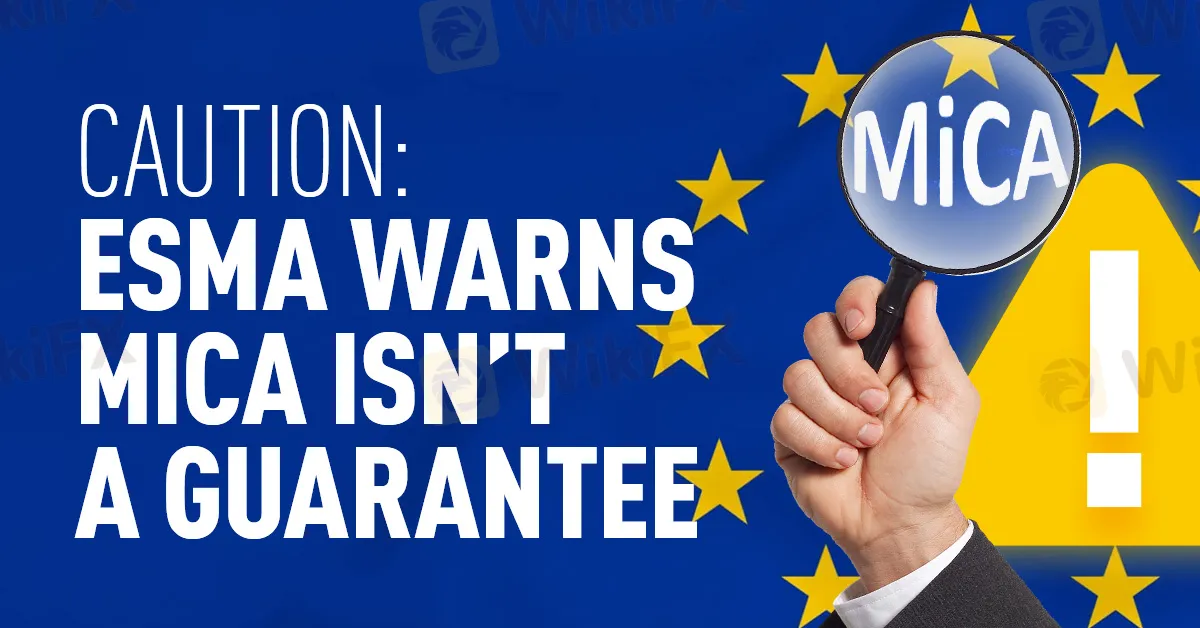简体中文
繁體中文
English
Pусский
日本語
ภาษาไทย
Tiếng Việt
Bahasa Indonesia
Español
हिन्दी
Filippiiniläinen
Français
Deutsch
Português
Türkçe
한국어
العربية
Caution: ESMA Warns MiCA Isn’t a Guarantee
Abstract:ESMA's MiCA regulation, effective June 2023, aims to regulate and enhance oversight in the cryptocurrency industry, collaborating with European authorities. It results in a significant decline in crypto fraud but a rise in payment sector fraud, cautioning protection for crypto retail traders by December 2024.

The impending enforcement of the Markets in Crypto-Assets (MiCA) regulation by the European Securities and Markets Authority (ESMA) signifies a significant stride towards enhanced oversight of digital assets. Set to take effect in June 2023, MiCA introduces a comprehensive plan devised by the regulator to address crypto-related risks and establish a regulatory framework for the digital asset domain.
In collaboration with the European Banking Authority, the European Insurance and Occupational Pensions Authority, and the European Central Bank, ESMA is actively engaged in a public consultation process to fine-tune the regulatory approach. The MiCA, unfolding over 12 to 18 months, encompasses three levels of implementation, with the ESMA introducing a series of technical standards through three distinct packages.

These measures, covering authorization, governance, conflict resolution, and complaint-handling procedures, lay the groundwork for a robust regulatory architecture aimed at bolstering the crypto ecosystem. The initial package, slated for launch in July 2023, delves into the specifics of mandates such as notification content, application for authorization, and complaint-handling procedures.
Subsequent packages, scheduled for October 2023 and Q1 2024, progressively address critical mandates, contributing to the comprehensive regulation of crypto-assets. As the ESMA's consultation process unfolds, stakeholders eagerly anticipate the clarity and certainty that MiCA is poised to bring to the market.
The cryptocurrency industry is on the brink of a transformative era, with a heightened focus on sustainability indicators, business continuity, trade transparency, and investor protection. Amid the evolving regulatory landscape, investors, businesses, and regulators alike must navigate these changes to ensure a secure and compliant future for crypto-assets in the European market.
A notable development has been the substantial decline of 51% in crypto fraud last year, attributed to the impact of the MiCA regulation. According to a report by AU10TIX, these regulations have not only suppressed illicit activities within the crypto space but have also shifted the attention of cybercriminals towards the payments sector.
While MiCA continues to fortify the crypto market against fraudulent activities, its repercussions are evident in the payments sector, where there was a notable 56% increase in reported fraud cases last year. Despite the positive impact on crypto fraud, the ESMA cautions that the regulations will not extend protection to crypto retail traders until December 2024.

Disclaimer:
The views in this article only represent the author's personal views, and do not constitute investment advice on this platform. This platform does not guarantee the accuracy, completeness and timeliness of the information in the article, and will not be liable for any loss caused by the use of or reliance on the information in the article.
Read more

Coinbase Under Scrutiny Amid Wrapped Bitcoin Delisting Controversy
Coinbase has come under fire after announcing its decision to delist Wrapped Bitcoin (wBTC), a move critics claim could be driven by competitive interests. The delisting, set to take effect on 19 December, has sparked allegations of market manipulation and concerns about fairness in the cryptocurrency ecosystem.

Solana Soars to All-Time High, Hits $264 on Coinbase
Solana hits $264 on Coinbase, breaking its 3-year high with an 11% daily surge. Learn what’s driving SOL's meteoric rise and the crypto market rally.

Bitcoin Nears $100,000: A Triumph of Optimism or a Warning Sign?
Bitcoin’s meteoric rise continues to capture global attention as its price recently surpassed the $99,000 mark, briefly approaching the $100,000 milestone. This unprecedented rally has led market sentiment to reach a state of “extreme greed,” according to the Fear and Greed Index. Analysts suggest that the market may be entering overheated territory, raising questions about sustainability amidst ongoing enthusiasm.

FCA Alerts Traders to New List of Unregulated and Clone Brokers
Protect your investments! Learn about unregulated firms flagged by the FCA and discover how WikiFX helps traders avoid scams and choose legitimate brokers.
WikiFX Broker
Latest News
Webull Partners with Coinbase to Offer Crypto Futures
eToro Expands Nationwide Access with New York Launch
Why Is UK Inflation Rising Again Despite Recent Lows?
Hackers Charged for $11M Crypto Theft Using SIM-Swaps
Role of Central Banks in the FX Market
FCA Alerts Against Sydney FX
What Makes Cross-Border Payments Easier Than Ever?
Trader Exposes Unethical Practices by STP Trading
Interactive Brokers Launches Tax-Friendly PEA Accounts in France
Google Warns of New Deepfake Scams and Crypto Fraud
Currency Calculator


